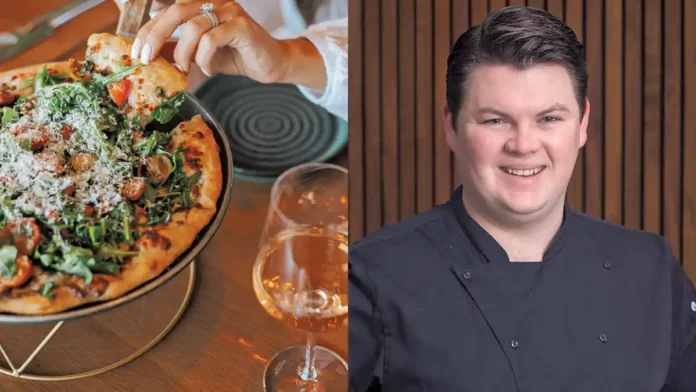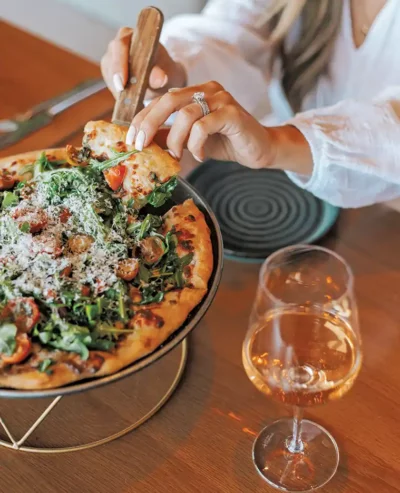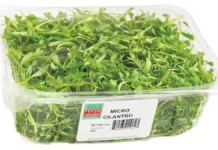
Q&A with Peter McQuaid, Executive Chef, CALA
Twenty-five-year-old Peter McQuaid is the Executive Chef at CALA, the coastal-inspired restaurant nestled in The Senna House hotel in the heart of Scottsdale, AZ’s, Old Town Entertainment district.
He’s now part of the growing team that is Clive Collective, where he opened two restaurants as the Executive Chef; Money, Baby! Las Vegas and CALA Scottsdale with his mentor Chef Beau MacMillan—of Sanctuary Camelback Mountain Resort & Spa fame.
McQuaid is a young leader in the industry, and he shares the attributes for his success, his passion for cooking and the importance of mentorship.
Walk us through your career track and how you found your passion for the culinary field.
For a school project, I decided to focus on food. I reached out to Chef Silvana Salcido Esparza and visited her restaurant, Barrio Cafe, and had the opportunity to make two of her famous dishes, Guacamole and Pollo Poblano. After working with Chef Silvana I had the opportunity to work at elements at the Sanctuary Resort. Being mentored by Chef Beau MacMillan was a turning point in my culinary career. I had the privilege of becoming the youngest Sous Chef he had ever hired, which was a tremendous honor and opportunity for growth.
During my time at elements, I was also involved in an incredible program called the Careers through Culinary Arts Program (C-CAP). This program aims to provide culinary scholarships and job training to deserving students. I was fortunate enough to be selected as a recipient of a C-CAP scholarship, which allowed me to further my culinary education at the International Culinary Center.
I had the opportunity to work at Restaurant Daniel, an esteemed Michelin-starred establishment, under the guidance of Chef Daniel Boulud. This experience in a high-pressure, fine dining environment pushed me to refine my skills.
I also interned at Daniel Humm’s Eleven Madison Park, David Chang’s Momofuku and Grant Achatz’s Alinea, where I rubbed elbows with some of the most celebrated chefs of our time.
I returned to Arizona to work at Elements at The Sanctuary Resort and was eventually named Sous Chef. I then created Emulsion Popup, a series of popup restaurants that for over two years individually embodied a unique theme and dining experience. That’s when I gained statewide recognition in the creation and execution of the dinner series and was featured in Phoenix Magazine as one of the best up and coming chefs in the Valley.

I also received the prestigious James Beard Foundation’s Taste America Award. Soon after, a new opportunity arose and I became Executive Chef of Mustang Monument Wild Horse Resort where I ran the food and beverage program for two seasons. During this time, I was featured in the Forbes Magazine travel guide. I also held the position of Executive Sous Chef at Forest Highlands Country Club.
If you were to pinpoint some of the most important elements required for being a successful chef, what would they be and why?
Being a Chef is so much more than just food and cooking; it’s about leadership, mentorship, and also being able to learn and grow from others around you. To be a successful Chef you have to be focused on building up your team and culture, you are nothing without your squad. Being a Chef is also about hospitality, we are able to convey emotions through food and I think that gets lost sometimes. We are here to connect with our guests and give them a great experience at our table.
What are the key elements for running a successful restaurant?
Your squad, you are nothing without your team. As Chef Beau always says, “it is people that illuminate kitchens and restaurants.” That could not be more true, with happy and enthusiastic individuals you will have the ability to cook amazing food and provide excellent service.
You’ve had many mentors, tell us about them, their help and advice, and their influences in your personal and professional life.
Chef Beau MacMillan has been there every step of the way through my career and has immersed me so much in the culinary field. We work together every single day and I couldn’t be more grateful for the guidance and support he has and continues to give to not only myself but everyone around him.
What is one piece of advice you would give to others who are just starting out in the culinary industry?
Number one is passion, always keep your passion fueled for food and the basics of cooking. Learn your basics whether that’s on the ground restaurant training or in culinary school. Always keep your head down, listen, learn and take in all you can from others around you whether you think they are right or wrong.

Here are Peter McQuaid’s expanded thoughts about Mentorship:
The restaurant industry, a fast-paced dominion that demands continual change, thrives off of creativity, innovation, and the mastery of the culinary arts. Amid the hustle and bustle, a secret force propels future culinary stars’ growth and development to be extraordinary within the culinary arts: mentors.
Mentorship, in the world of chefs, is a sacred alliance that transcends the boundaries of a kitchen. It is the bridge that connects tradition with innovation, technique with creativity, and novice with maestro. Just as a chef imparts flavors into a dish, mentors infuse knowledge, skills, and guidance into the aspiring minds of future chefs.
The Essence Of Mentorship
Mentorship is a symbiotic relationship that allows seasoned veterans to impart insights acquired through years of experience to fresh talent. A mentor within the restaurant industry can share the artistry and prowess needed to excel in the culinary world. Likewise, the young future mentee is able to impart new knowledge, skills, and ideas to seasoned veteran chefs. Mentorship within the restaurant industry has many added benefits to the mentor and mentee but also to the industry as a whole.
Personal Benefits
Within the restaurant industry, at the heart of mentorship lies skill development. If you strip away all the other added benefits you will find mentorship at the core that the transference of skill set is the most important. Having a seasoned chef as a mentor transforms the kitchen into a dynamic classroom, where mentors not only teach important culinary techniques but also the finesse of timing, the chemistry of flavors, and the art of presentation. This type of knowledge that mentors impart; you won’t find in a classroom.
As culinary protégés enter uncharted territory, they will encounter a conglomerate of challenges that will push their limits. From disgruntled customers to kitchen crises to team collaboration, the restaurant industry will throw challenges at new chefs that the classroom can’t prepare them for.
This is where mentors become steady anchors, providing advice and wisdom to mentees when faced with challenges. Mentors are able to provide practical solutions, strategic insights, and emotional support that would otherwise cripple new chefs. Mentorship equips budding professionals with the right tools and resources to navigate challenges with resilience allowing mentees to thrive.
In an industry notorious for its grueling hours and high-pressure environments, mentors become a pillar of support. A mentor becomes a confidant, someone to bounce ideas off of, and a source of encouragement when pressure and stress let self-doubt creep in. This emotional connection becomes a lifeline that prevents burnout, nurturing talent that may have otherwise been lost to the demanding nature of the industry.
The Whole Industry
Mentorship within the restaurant industry can also be a conduit for passing down culinary traditions, innovative techniques, and evolving trends. It bridges the gap between generations and becomes a custodian of culture, safeguarding the essence of a restaurant’s identity while still embracing innovation. When new chefs receive mentorship from seasoned culinary experts it nurtures a new generation of culinary artists who not only refine existing traditions but also dare to experiment and create new ones.
Technology is influencing every industry and restaurants are no exception. With the rapid evolution of technology, new cutting-edge techniques are being developed in the culinary world. Mentors play a pivotal role in making sure the newer generation of culinary experts embrace innovation without compromising the human touch that defines the industry.
Mentorship doesn’t just happen by chance; it requires a deliberate commitment by both parties. Restaurants that prioritize mentorship cultivate a culture of innovation, where excellence is a shared aspiration. Such establishments allow space for mentorship, allocate time for regular interactions and celebrate the success that comes from it. Not only does mentorship become valuable to both the mentor and mentee but can be vital to restaurants’ success.
The Impact
The impact of chefs receiving mentorship extends beyond the walls of the kitchen. It ripples through the entire establishment, elevating standards and inspiring innovation across the board. A mentee who rises through the ranks with knowledge and wisdom from those that came before them can create better environments for employees and customers.
It can also create a domino effect within the restaurant industry itself contributing to the industry’s evolution and ensuring that the flame of passion and excellence is passed down through the generations.
Mentorship in the restaurant industry is not merely optional; it is the secret ingredient that elevates good establishments to great ones. It shapes careers, fuels innovation, and preserves traditions. The bond between mentor and mentee shows the power of human connection in an industry that thrives on creating memorable experiences.
As the industry continues to evolve, mentorship remains to be a pillar ensuring the restaurant industry’s enduring success. In the kitchen’s fiery crucible, mentorship shapes chefs, and through them, it shapes the very essence of the culinary world itself.























